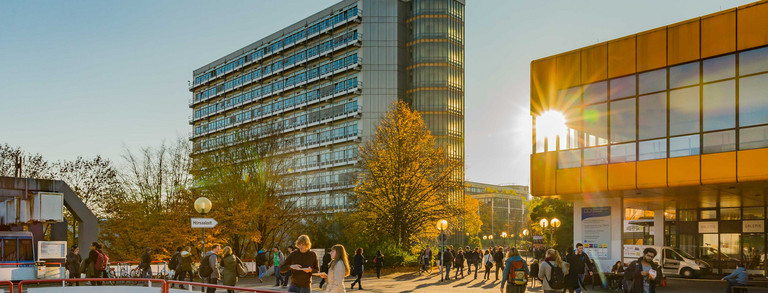Tessa-Marie Menzel, M. A.
Main focus in research and teaching
- Family research
- Social media in the context of family and gender
- Counseling and interviewing
- Didactics of social pedagogy
- Heterogeneity, inclusion and individual support
Office hours
GENERAL Office Hours:
https://terminplaner4.dfn.de/ze6Pq7YWUr22uOjX
Please send me previous documents for preparation by mail when discussing study and examination results.
Consultation hour on FACHPRAKTIKA:
Please inform our student assistant Cansu Arslan about your concerns by mail. If necessary, an individual (telephone) appointment can be made for consultation. Please send your documents for the crediting of the professional practical activity scanned in PDF format bundled in one mail to:
orga.sozialpaedagogik.fk12@tu-dortmund.de
We will then take care of your request and get back to you!
More information
Since 2019 PhD in Educational Science at the Technical University of Dortmund More information: here.
Since 2018 Research Assistant at the Institute for Social Pedagogy, Adult Education and Early Childhood Education (ISEP), Technical University.
2015-2018 Student assistant at the Institute of Educational Science, University of Osnabrück, Department of Socialization.
2015-2018 Master's degree in Educational Science (Master of Arts) at the University of Osnabrück with a focus on education in social heterogeneity
2012-2015 Bachelor studies of Educational Science and Philosophy (Bachelor of Arts) at the University of Osnabrück.
Since 2022 Career certificate program "Academia & Research", Graduate Center of the Technische Universität Dortmund
2019 - 2022 Continuing education "Professional Teaching Competence for Higher Education", Netzwerk Hochschuldidaktik NRW, Technical University of Dortmund
2018 - 2019 Continuing education "Systemic Counseling", Arbeitskreis soziale Bildung und Beratung e.V., Münster, Germany
2013 - 2015 Continuing education "Person-centered counseling", Gesellschaft für personenzentrierte Psychotherapie und Beratung e.V. (GwG), Münster
- German Society for Educational Science (DGfE), Section for Social Pedagogy and Early Childhood Education and Section for Women's and Gender Studies in Educational Science (associate member)
- European Society on Family Relations (ESFR)
- Network Women's and Gender Studies NRW
- Network Educational Family Research
- "#Orientierung – Social Media als Ratgebermedium?“, ein Vortrag im Rahmen der TikTokTalks des ZeBo Hagen, November 2024, FernUniversität in Hagen (online)
- "#TradWife, #AlphaMale und Co. - Ein gendersensibler Blick auf Trends in den Sozialen Medien", ein Vortrag im Rahmen der digitalen Vortragsreihe des Instituts für Soziale Arbeit und Sozialpädagogik, November 2023, Leuphana Universität Lüneburg (online)
- "#momlife - Mutterschaft in den Sozialen Medien", ein Vortrag im Rahmen des 22. Symposium der Vereinigung für Interdisziplinären Frühförderung e.V. (VIFF), September 2023, Universität zu Köln
- "Sharenting - A violation against childrens rights?!", ein Symposiumsbeitrag im Rahmen der Tagung "Family Life - Troubling Family Relations and Practices" der European Society on Family Relations (ESFR), Juni 2023, Roskilde University, Dänemark
- „Leitbilder ‚guter‘ Mutterschaft – Ein Dissertationsprojekt zur Darstellung von Mutterschaft in den sozialen Medien am Beispiel der Mumfluencerinnen“, ein Beitrag im Rahmen des 21. Netzwerktreffen Wissenssoziologischer Diskursanalyse, Juni 2021, Onlineveranstaltung
- "Kritische Reflexion mithilfe von Portfolios im Lehramtsstudium der beruflichen Fachrichtung Sozialpädagogik", ein Forumsbeitrag im Rahmen der Jahrestagung der DGfE-Kommission Sozialpädagogik, März 2021, Universität Erfurt (online)
- Menzel, Tessa-Marie (2024): Instagram als Ratgebermedium am Beispiel der Momfluencerinnen. Oder: "keiner muss sich durch Bücher wälzen". In: Sauerbrey, Ulf; Großkopf, Steffen; Ott, Christine (Hrsg.): Empirische Ratgeberforschung. Forschungszugänge und Befunde zu Produkten, Angebot und Inanspruchnahme ratgeberhafter Medien. Bad Heilbrunn: Klinkhardt. doi.org/10.35468/6097
- Menzel, Tessa-Marie (2023): #bedürfnisorientiert und #bindungsorientiert. Ein Erziehungstrend in den Sozialen Medien. In: Sozial Extra, 47 (6). doi.org/10.1007/s12054-023-00639-8
- Equit, Claudia; Menzel, Tessa-Marie (2023): Theorielose Empirie? Ideen zu einem theoretisch sensibilisierten Forschen mit der Grounded Theory. In: Ecarius, Jutta; Oliveras, Ronnie (Hrsg.): Qualitatives Forschen in der Erziehungswissenschaft. Prozesse und Vielfalt der rekonstruktiven Erkenntnisgewinnung. Barbara Budrich.
- Heller, Patricia; Menzel, Tessa-Marie; Kassis, Wassilis (2018): Resilient trotz Ausgrenzung? Muslimische Studierende im Spannungsfeld zwischen Normalisierung und Visibility. In: Hafez, Farid (Hrsg.): Jahrbuch für Islamophobieforschung 2018. New academic press. S. 89-110.

